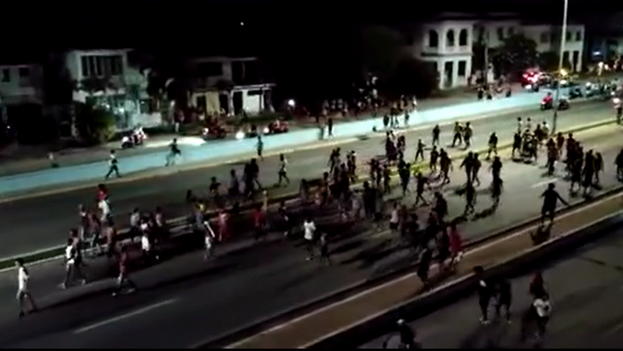
![]() EFE (via 14ymedio), Havana, 28 March 2023 — The NGO Amnesty International (AI) denounced on Monday in its annual report the “hundreds of people” in prison in Cuba for “the peaceful exercise of their human rights” — including “three prisoners of conscience” — and the “repression” of “dissidence” and protests.
EFE (via 14ymedio), Havana, 28 March 2023 — The NGO Amnesty International (AI) denounced on Monday in its annual report the “hundreds of people” in prison in Cuba for “the peaceful exercise of their human rights” — including “three prisoners of conscience” — and the “repression” of “dissidence” and protests.
In its document, which summarizes the most relevant violations of the year by country, it also notes that the new Cuban Criminal Code consolidates “limitations on freedom of expression and assembly as is customary” and represents “a disturbing panorama for independent journalists, activists and anyone critical of the authorities.”
It also highlights the social problems due to the “food shortage” suffered by the country and the “frequent” power outages. It says that the State has the “obligation to enforce the economic, social and cultural rights” of citizens.
The NGO points out that at the end of last year “hundreds of people who had suffered the repression of the July 2021 protests were still in prison,” the largest in decades.
The demonstrations were spontaneous and mostly peaceful at a time of serious economic crisis due to the concurrence of the pandemic, the tightening of US sanctions and errors in national economic policy.
AI also recalled that in September and October, after the passage of Hurricane Ian, “there were protests throughout the Island against widespread power outages,” in which “the authorities responded by deploying military cadets to suppress the protests and used arbitrary detentions.”
The authorities “interrupted access” to the Internet “deliberately,” said AI, which is an “increasingly common tactic to limit communication in Cuba in delicate moments from the political point of view.”
The NGO indicated that the Cuban president, Miguel Díaz-Canel, “undermined the importance of the widespread nature of the protests,” attributing them to a “minority of counterrevolutionaries with connections outside Cuba” and reducing them to acts of “vandalism” that would be confronted with “the rigor of the law.”
“Three prisoners of conscience remain in prison, a figure that represents only a tiny percentage of the total number of people who were detained for the peaceful exercise of their human rights,” the report adds.
AI was referring to the artist and activist Luis Manuel Otero Alcántara, the musician Maykel Castillo Osorbo and the opposition leader José Daniel Ferrer, for whom it denounced the periods that Ferrer passed in “solitary confinement” and “incommunication” in prison.
The document also mentions the strong migration that the country suffers, the approval in September of the Family Code — which legalized marriage and adoption for homosexuals — and the non-inclusion of femicide in the new Criminal Code.
Translated by Regina Anavy
____________
COLLABORATE WITH OUR WORK: The 14ymedio team is committed to practicing serious journalism that reflects Cuba’s reality in all its depth. Thank you for joining us on this long journey. We invite you to continue supporting us by becoming a member of 14ymedio now. Together we can continue transforming journalism in Cuba.
